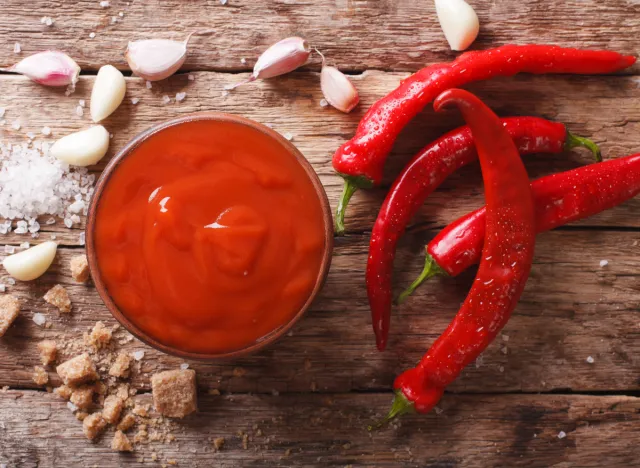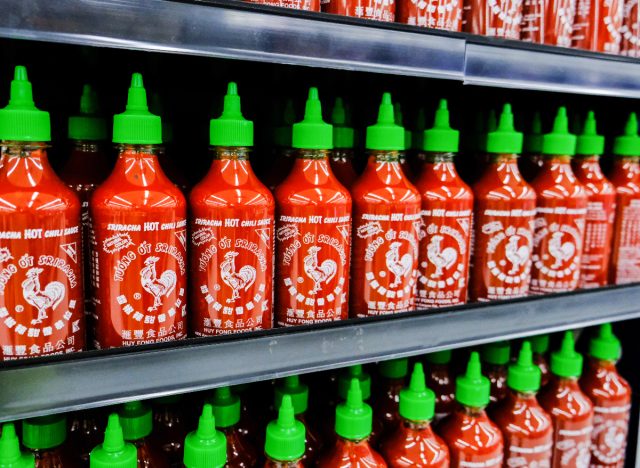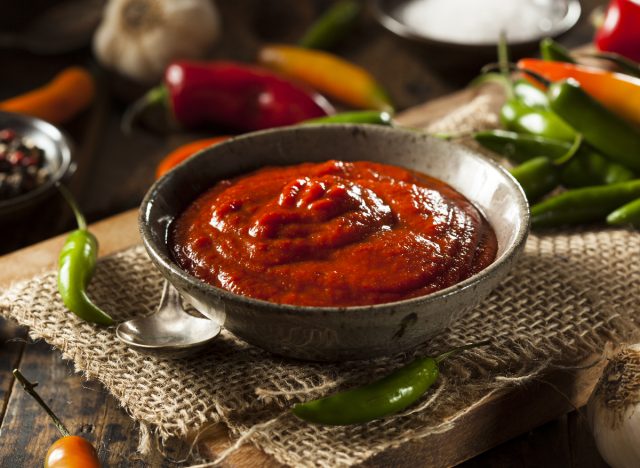If you need a little something to spice up, well, just about anything—sriracha is the obvious answer. From eggs, dips, meat, toast, vegetables, salads, and even ice cream (yes, this is a thing), sriracha can take literally any dish from boring to zingy and flavorful.
But, while you're busy treating your tastebuds by slathering the red stuff on your avocado toast and egg salads, sriracha could be affecting your body in surprising ways.
Sriracha stands apart from other hot sauces because of its thickness and sweet garlic-y taste. The ingredient list is short with just chili peppers, sugar, garlic, vinegar, and salt (as well as preservatives and thickeners in some brands). And, nutritionally, there's not much there.
One teaspoon of sriracha has 6 calories, 1.2 grams of carbohydrates, and 138 milligrams of sodium.
You could lose weight.

Topping your meal with sriracha could give your metabolism a boost.
"One of the main ingredients in sriracha sauce is chili peppers, which contain capsaicin," says Elysia Cartlidge, MAN, RD, registered dietitian and founder of Haute & Healthy Living. "Capsaicin not only gives the sauce its fiery taste but can also act as a thermogenic chemical, producing heat that may potentially stimulate your metabolism and help burn fat."
In one small study, researchers found that people who ate capsaicin with each meal were less likely to overeat and had higher levels of satiety and fullness compared to those who did not eat capsaicin with their meals.
You could have an allergic reaction.

Some brands of sriracha use sodium bisulfite as a preservative. "Sriracha may cause an adverse reaction in those with sulfite sensitivity, resulting in wheezing, hives, and stomach upset," says Melissa Mitri, MS, RD of Melissa Mitri Nutrition.
Sulfite allergies are most common in people who also have asthma, according to the Cleveland Clinic. The chances of having a sulfite allergy if you do have asthma are between 1 in 40 and 1 in 100. If you know that you're sensitive to sulfites, the key to avoiding negative reactions is avoiding sulfite-containing foods including some types of wine, shrimp, potatoes, and condiments.
It might make you poop.

If spicy foods tend to run right through you, you're not alone. "The spice in sriracha comes from capsaicin which can irritate your gut leading to a looser bowel movement," says Amanda Sauceda, MS, RD.
When you eat foods with capsaicin, a protein called the vanilloid receptor 1 (or TRPV1) is stimulated to let your brain know that your insides are burning. To protect your insides, your body releases endorphins to block pain and sends the capsaicin through the digestive tract so quickly, that, for some people, the colon doesn't have time to absorb water as it usually does.
"You may even notice you have 'spicy' poops," adds Sauceda. With more pain receptors in the anus, the capsaicin can cause a burning sensation as it exits the body.
It could give you heartburn.

If you're no stranger to acid reflux, eating sriracha could make your symptoms worse.
Researchers have found that the capsaicin in red chili peppers causes food to sit in your stomach for a longer period of time, increasing the chances of acid reflux, while also irritating the esophagus. This can make your heartburn even more painful.
If capsaicin isn't enough to do the trick, the garlic in sriracha can add to heartburn symptoms as well. Between your stomach and esophagus is a little flap called the esophageal sphincter. This flap should stay closed to keep stomach acid from entering your esophagus. Garlic has the potential to weaken the pressure on this sphincter, increasing the chances of heartburn after eating it.
No comments:
Post a Comment